Chapter 1: Introduction: Get an in-depth look at the world of medical FPC PCB manufacturing and the complex process of
integrating FPC technology into next-generation medical devices, as discussed by Capel Factory’s experienced FPC engineers.
As an experienced FPC engineer at the Capel factory, I have encountered countless challenges and successful solutions in the field of medical PCB manufacturing. Capel Factory has been at the forefront of producing advanced and customized solutions for the medical industry for many years, by developing high-quality 14-layer FPC flexible circuit boards to meet the specific needs of medical equipment such as CT scanners. This article aims to provide an in-depth look at the process of integrating medical FPC into next-generation medical devices, addressing the unique requirements and industry-specific challenges that come with it.
Chapter 2: Overview of FPC in Medical Imaging Equipment: Understand the critical role of FPC technology in medical imaging
equipment, especially CT scanners, and the growing demand for high-performance FPC to meet changing medical diagnostic
requirements.
Medical imaging equipment, especially CT scanners, rely heavily on the accuracy and reliability of FPC flexible circuit boards to ensure seamless functionality. As the demand for advanced, accurate medical diagnostics continues to grow, the demand for high-performance FPCs in these devices has surged. Therefore, this has prompted the industry to push the boundaries of circuit board technology to meet the ever-changing needs of medical devices.
Chapter 3: Key Specifications and Challenges provides an in-depth look at the specific requirements and challenges involved in
developing 14-layer FPC flexible circuit boards for medical imaging equipment, including strict specifications and technical
hurdles.
While meeting the specific requirements of medical imaging equipment, the engineering team at the Capel facility encountered several key specifications that needed to be met rigorously to ensure the effectiveness and reliability of the circuit board.
Product type: 14-layer FPC flexible circuit board
Applications: Medical imaging equipment, especially CT scanners
Line width, line spacing: 0.2mm/0.2mm
Plate thickness: 0.2mm
Minimum hole diameter: 0.3mm
Copper thickness: 18um
Stiffness: steel plate
Surface treatment: immersion gold
Special Process:/
Each of these specifications poses significant challenges that require expertise and innovative technologies to overcome. For example, meeting strict standards for line width and line spacing requires precise manufacturing processes and cutting-edge technology to ensure FPC reliability and performance in medical applications. The development of these 14-layer FPC flex circuit boards presented a unique set of technical challenges, including thermal management, material selection and signal integrity, all of which needed to be carefully addressed to ensure the boards function optimally in medical imaging devices.
Chapter 4: Solving Industry-Specific Challenges: Explore custom solutions and innovative technologies for solving the unique
challenges of integrating FPC technology into next-generation medical devices, focusing on real-world case studies.
Successful integration of FPC flexible circuit boards into next-generation medical devices, especially CT scanners, requires a comprehensive understanding of the challenges inherent in the medical industry and the ability to develop custom solutions that meet strict specifications while complying with industry compliance standard.
Real Case Study: Solving Challenges for CT Scanner Applications The following case study highlights Capel Factory’s successful collaboration with a leading medical device manufacturer to address and overcome industry-specific challenges encountered in developing high-performance FPCs for CT scanner applications. challenge.
Background: The customer, a prominent medical device manufacturer, approached Capel Factory for help integrating an advanced FPC into their next-generation CT scanner. The main goal is to develop an FPC that provides excellent thermal management, excellent signal integrity and reliability to meet the demanding requirements of CT imaging technology.
Challenge: Customers have very strict requirements for 14-layer FPC and have raised a number of challenges, including but not limited to:
Line width and line spacing accuracy: FPC needs to achieve a line width and line spacing of 0.2mm/0.2mm to ensure high-density integration of components in the CT scanner.
Plate Thickness and Stiffness: FPC had to maintain a thickness of 0.2 mm while adding steel plates for increased stiffness, which posed a challenge to ensure flexibility without compromising structural integrity.
Copper thickness: Meeting the specified 18um copper thickness is critical to ensuring the conductivity and performance of the FPC in CT scanners.
Surface treatment: In order to ensure the corrosion resistance and weldability of FPC, immersion gold treatment is required, which increases the complexity of the manufacturing process.
Special processes: While the nature of the special processes remains confidential, they pose additional technical hurdles to FPC manufacturing.
Solutions and Results: To solve the challenges presented by our customers, Capel Factory’s engineering team leveraged its extensive experience in medical PCB manufacturing and employed innovative technologies to develop custom solutions. Here are the main solutions and results achieved:
Accurate and reliable line width and line spacing: Through advanced manufacturing processes and cutting-edge equipment, Capel Factory’s engineering team achieved precise line width and line spacing of 0.2mm/0.2mm to meet customers’ high-density integration requirements.
Enhanced Thermal Management and Structural Integrity: Through careful selection of materials and the use of advanced thermal management technology, Capel Factory has managed to maintain the required plate thickness at 0.2 mm while adding steel plates for increased stiffness, ensuring FPC stability in CT scanners flexibility and structural integrity.
Optimum copper thickness and surface treatment: The engineering team effectively controls and maintains the specified 18um copper thickness and performs immersion gold treatment to ensure the excellent conductivity, corrosion resistance and solderability of the FPC to meet the strict requirements of customers.
Special process: Confidential special processes have been successfully integrated to add unique features to the FPC without compromising reliability and
performance.
Implications and Conclusions: Collaboration between Capel Factory and medical device manufacturers successfully developed high-performance FPCs and integrated them into next-generation CT scanners. Tailor-made solutions and meticulous attention to detail not only meet but exceed customer expectations, demonstrating Capel Factory’s expertise in solving complex industry-specific challenges and delivering cutting-edge solutions for medical applications.
Looking ahead: As the medical industry continues to evolve, the need for next-generation medical devices with advanced imaging capabilities will continue, driving the need for highly specialized FPCs that can meet the changing requirements of medical devices.
The successful case studies presented here demonstrate Capel Factory’s commitment to innovation and excellence in developing FPCs for medical applications. By continually refining our manufacturing processes, adopting new technologies, and keeping up with industry trends, Capel Factory is poised to play a key role in shaping the future of medical imaging technology through the seamless integration of high-performance FPCs.
Medical FPC Manufacturing Process
Chapter 5: Moving Forward: Learn about the future trajectory of FPC technology in medical devices and the Capel facility’s
commitment to pushing the boundaries of innovation in medical PCB manufacturing.
In summary, integrating medical FPC into next-generation medical devices requires a deep understanding of industry-specific challenges, a commitment to accuracy and reliability, and the ability to develop custom solutions that meet the stringent requirements of medical applications. Capel Factory’s success in overcoming these challenges and delivering superior results underscores our commitment to pushing the boundaries of technological innovation and shaping the future of medical imaging equipment.
As a Lead FPC Engineer at Capel Factory, I am proud to be part of a team that continues to advance the medical PCB manufacturing industry, providing cutting-edge solutions that enable the development of next-generation medical devices and contribute to the advancement of healthcare. Contribute technology.
The road ahead is filled with opportunities for collaboration, innovation and the continuous pursuit of excellence in FPC development for the medical industry. As we stand on the cusp of a new era of medical technology, I believe Capel Factory will continue to lead the way in integrating medical FPC into next-generation medical devices, shape the future of medical imaging technology, and have a meaningful impact on medical imaging technology. Healthcare landscape.
Post time: Feb-26-2024
Back








